Table of Contents
In this blog post, you will learn about articles in English, which are words used to define nouns as specific or general. The three main articles are “a,” “an,” and “the.” Understanding the rules and proper usage of articles helps make your sentences clear and grammatically correct.
We will explain their types, usage rules, and provide simple examples to help you grasp the concept easily.
What is an Article?
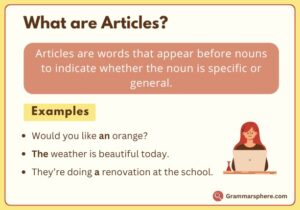
An article is a word that comes before a noun to define it as specific or general.
Examples:
The car parked outside is mine. (specific)
I saw a movie yesterday. (general)
She adopted an adorable puppy. (general)
Types of Articles
There are two types of articles.
1: Definite article
2: indefinite article
Definite Article (the)
This article is used for specific items or people the listener already knows. “The” points to something definite, making it clear which person, place, or thing is being referred to.
- The teacher explained the lesson well.
- I visited the museum yesterday.
- She closed the door quietly.
indefinite article (a and an)
These articles refer to something general or unspecific. They introduce a noun for the first time or when the listener doesn’t know the exact item being mentioned.
- She adopted a puppy from the shelter.
- He has a meeting scheduled for tomorrow.
- There’s an apple on the table.
An article before an adjective
An article before an adjective helps to add more detail or emphasis to a noun. When we place an article before an adjective, it makes the description of the noun clearer and sometimes more specific.
Both definite (the) and indefinite (a and an) articles can be used before adjectives.
The (Specific)
Use the before an adjective when referring to something specific.
- She adopted the cutest puppy.
- He went to buy the expensive dress.
A (General, Consonant Sound)
Use a before an adjective that starts with a consonant sound.
- He wore a blue jacket.
- She received a reward at the ceremony.
An (General, Vowel Sound)
Use an before an adjective that starts with a vowel sound.
- They had an amazing vacation.
- He saw an elephant in the zoo.
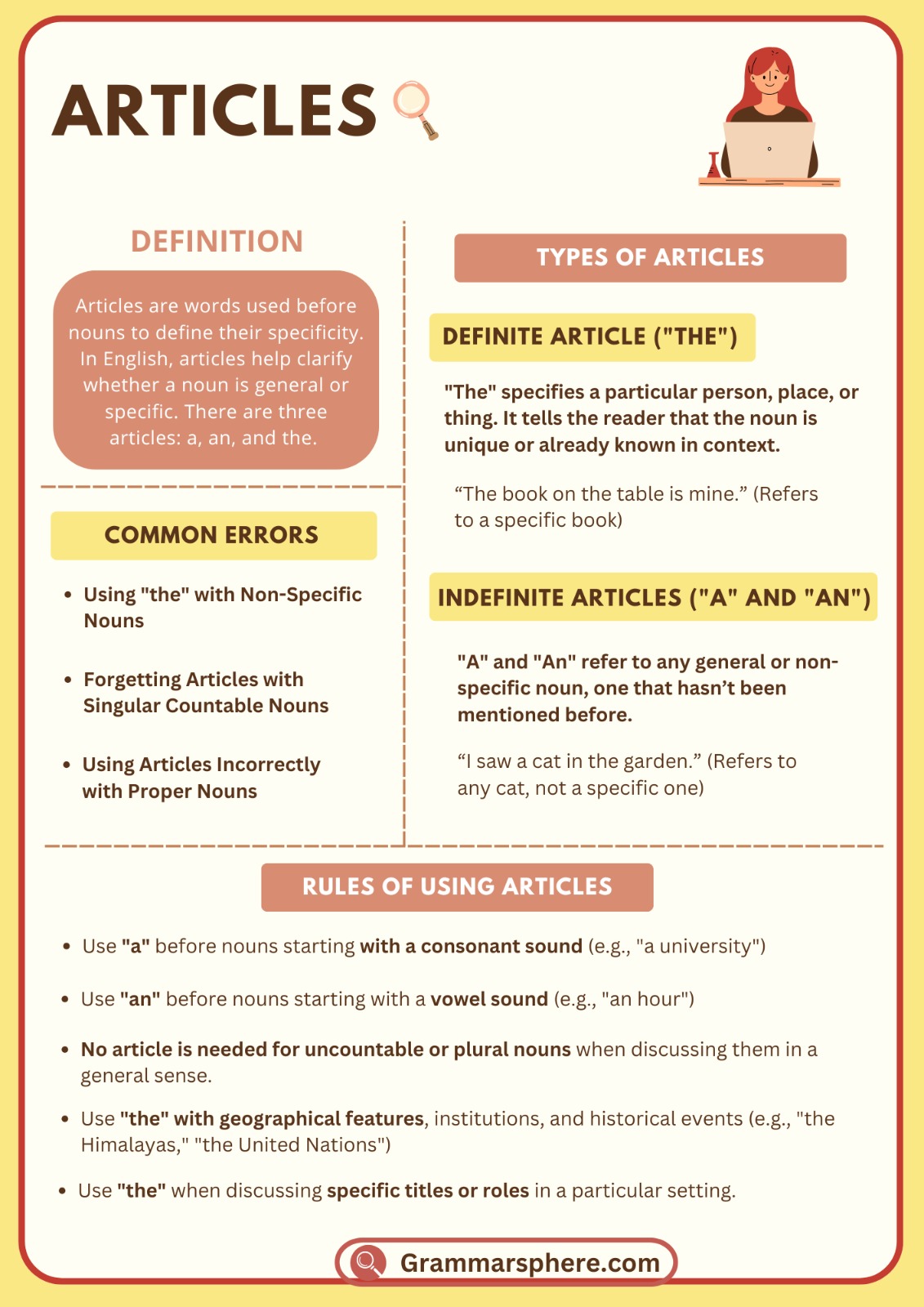
Using Indefinite Articles with Uncountable Nouns
| Uncountable Noun | Example (❌ Incorrect Usage) | Example (✅ Correct Usage) |
|---|---|---|
| Water | She poured a water into the glass. | She poured water into the glass. |
| Advice | He gave me an advice about my career. | He gave me good advice about my career. |
| Information | They provided an information about the event. | They provided useful information about the event. |
| Furniture | She bought a furniture for her apartment. | She bought new furniture for her apartment. |
| Knowledge | His a knowledge of history is impressive. | His knowledge of history is impressive. |
Using articles with pronouns
Articles (a, an, and the) are generally used with nouns rather than pronouns. Since pronouns (like he, she, they, we) already specify or generalize a person or thing, adding an article is unnecessary and incorrect.
However, articles can be used alongside nouns that follow a pronoun in some cases.
- He is the best candidate for the job.
- They need an umbrella if it rains.
- We saw a movie yesterday.
- He bought the car we talked about.
- You should visit the museum.
Omission of articles
Omission of Articles refers to situations where articles (a, an, and the) are not used before certain nouns. In English, there are specific cases where articles are not needed, and knowing when to omit them is essential for sounding natural and clear.
Situations Where Articles Are Omitted
1. Before Uncountable Nouns (when speaking in general)
When discussing uncountable nouns in a general sense, we don’t use articles. These include nouns like information, advice, water, milk, and music.
- Knowledge is essential for growth.
- She enjoys listening to music.
2. Before Plural Countable Nouns (when speaking in general)
When referring to plural nouns in a general context, articles are not used.
- Books are valuable sources of knowledge.
- Teachers work hard to support their students.
3. Before Names of Countries, Cities, and Continents
Articles are generally omitted before names of places, countries, continents, and cities.
- She traveled to Italy last summer.
- They moved to Paris for work.
4. Before Meals and Days of the Week
When mentioning meals or days of the week in a general sense, articles are not used.
- We usually have breakfast at 8 a.m.
- Monday is the first day of the week.
5. Before Languages and Subjects
Articles are not used before the names of languages or academic subjects.
- He is studying mathematics.
- She speaks Spanish fluently.
Examples of Articles in English
- She bought a beautiful dress for the party.
- He found an old coin in the backyard.
- The book on the table is mine.
- We saw an interesting movie last night.
- She’s planning to adopt a cat from the shelter.
- I enjoyed the concert on Saturday.
- There’s a good restaurant nearby.
- The weather was perfect for a picnic.
- He read an inspiring story in the magazine.
- The car he drives is brand new.
Rules for Articles
1. The Definite Article “The”
The is a definite article used to refer to a specific person, place, or thing that both the speaker and listener are familiar with. It can be used with both singular and plural nouns and when a noun is unique or known.
- The sun rises in the east.
- I saw the movie you recommended.
2. The Indefinite Article “A”
A is an indefinite article used with singular nouns when referring to something general or not specific. It’s often used before words that start with a consonant sound.
- She adopted a cat from the shelter.
- He wants to become a doctor.
3. The Indefinite Article “An”
An is also an indefinite article used similarly to “a,” but it appears before words starting with a vowel sound (a, e, i, o, u). This usage ensures smooth pronunciation.
- She has an idea for the project.
- They visited an old temple in the mountains.
4. Using “The” for Musical Instruments and Specific Groups
The is used before musical instruments and specific groups of people or things. This usage makes the reference sound more universal or specific.
- She plays the piano beautifully.
- The elderly should receive more care and respect.
5. Omitting Articles with Plural and Uncountable Nouns
Articles are often not used when referring to plural or uncountable nouns in a general sense. When these nouns are general, omitting an article keeps the sentence clear and concise.
- She loves coffee in the morning.
- Children need proper nutrition to grow.
FAQS
1. When should I use “a” vs. “an”?
Use “a” before words that start with a consonant sound (a book, a dog). Use “an” before words that start with a vowel sound (an apple, an hour). The key is the sound, not just the letter.
2. When do we use “the” instead of “a” or “an”?
Use “the” when talking about something specific or already known (the sun, the president, the book on the table). Use “a” or “an” for something general or mentioned for the first time (a cat, an idea).
3. Can we use “the” before proper nouns?
Yes, but only with certain proper nouns, like oceans (the Pacific Ocean), rivers (the Nile), countries with plural names (the United States), and unique landmarks (the Eiffel Tower). Most personal names and singular country names don’t take “the” (Michael, India).
4. Why don’t we use “a” or “an” with uncountable nouns?
Uncountable nouns (e.g., water, advice, furniture, information) don’t have singular forms that take “a” or “an.” Instead, use some, a piece of, or a bit of (some advice, a piece of furniture).
5. Can a sentence be correct without an article?
Yes, in cases like plural general nouns (Cats are cute), uncountable nouns (She likes coffee), and proper nouns (Ali lives in Dubai). However, articles are required for specific references (The cats in my house are cute).
You May Also Like

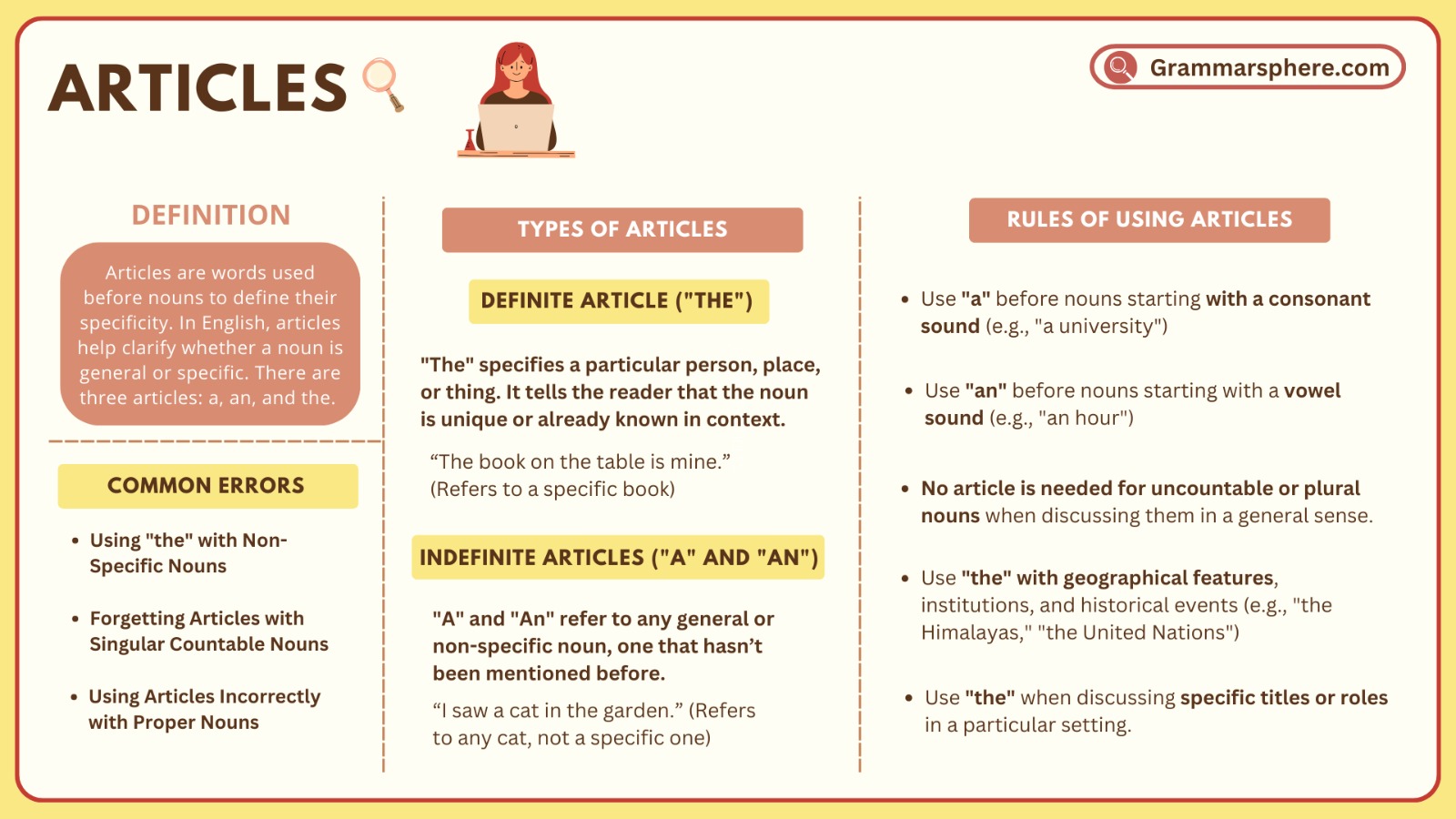
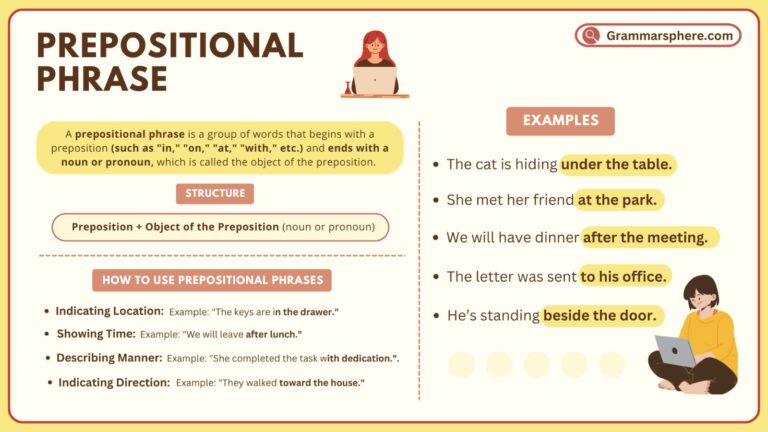
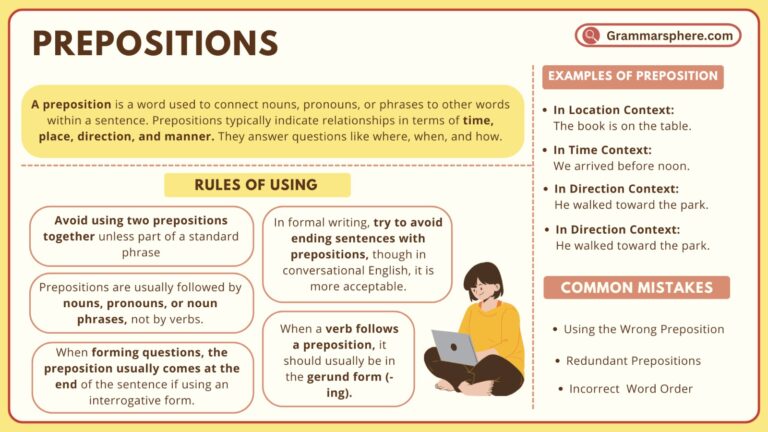
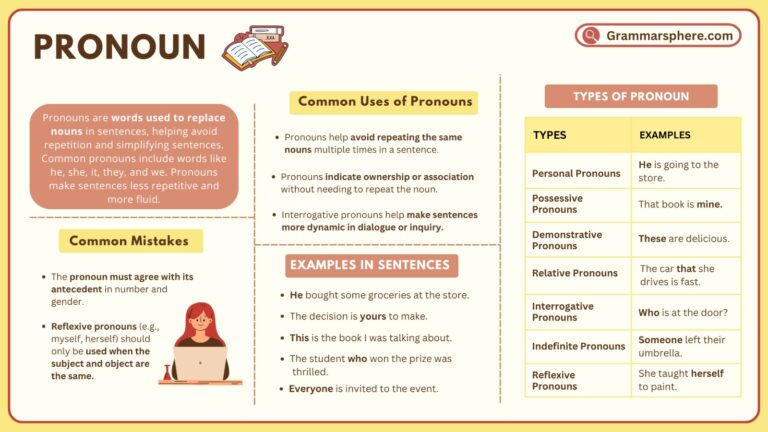
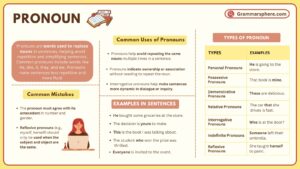
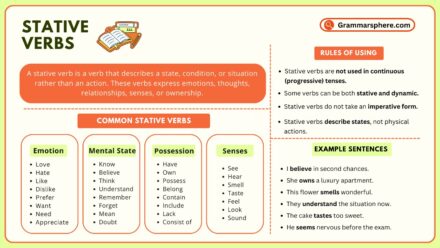
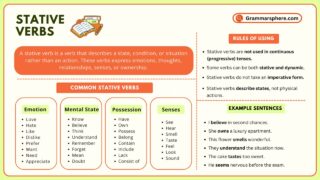
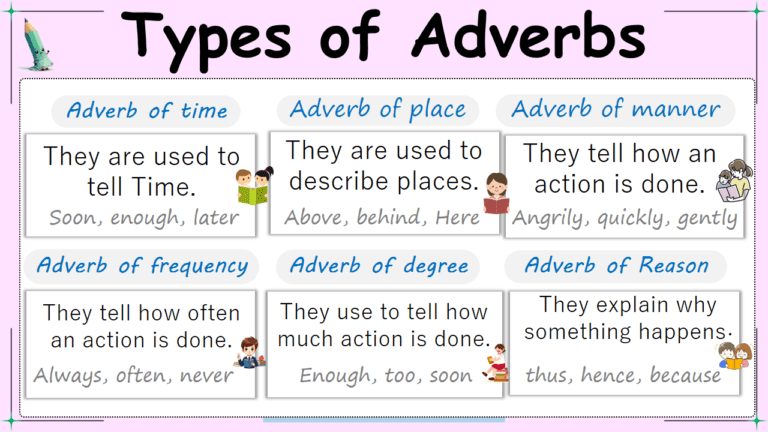
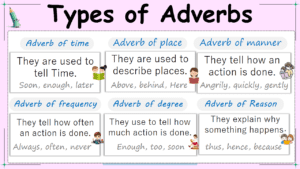
Leave a Comment